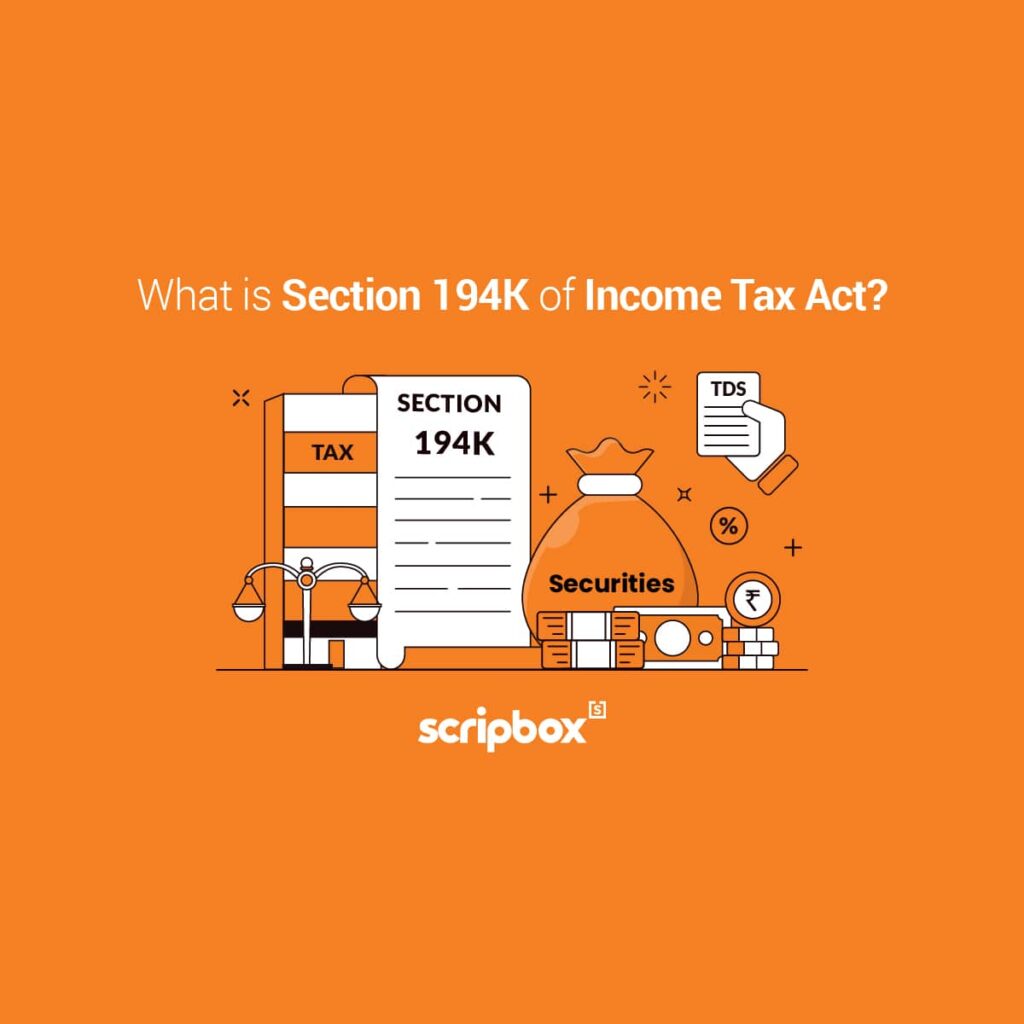During Budget 2020, the finance minister, Nirmala Sitharaman, recommended the addition of Section 194K to the Finance Act. This clause allows any resident individual to deduct the amount paid on mutual fund units, up to a certain limit.
What is Section 194K?
Section 194K of the Income Tax Act, 1961 provides for a deduction of TDS at a fixed rate of 10% on dividend income from mutual funds. Hence, the income provider will deduct TDS from the income generated by the mutual fund investor. The investor will receive income from the scheme minus the TDS. The investor or the taxpayer can claim a tax refund of the TDS at the time of filing the income tax return.
What Are the Types of Income From Mutual Funds?
Generally, a person can generate two forms of income by investing in mutual funds and paying tax on mutual funds. The following are those incomes:
- Dividend Income
- Capital Gains Income
Let’s talk about both the incomes one by one:
- Dividend Income- The existing income tax law taxes the dividends (Dividend Distribution Tax) paid on behalf of investors by fund houses (asset management companies). According to Budget 2020, DDT has been discontinued. Dividend income will be taxable in the hands of the receiver/investor beginning in FY 2020-21. However, the new Section 194K of the Finance Act of 2021 compels mutual funds to withhold TDS when issuing dividends to unit holders in excess of Rs 5,000.
- Capital Gains Income- According to the existing tax laws, capital gains are taxable in the hands of the taxpayer. If long-term capital gains from equity-oriented mutual funds exceed Rs 1 lakh in a year, the profits will be taxable at a rate of 10%. Short-term capital gains on equity-oriented mutual funds that are subject to STT is taxable at a rate of 15%. However, under the new Section 194K of the Finance Act of 2021, a mutual fund is not required to pay TDS on capital gains deriving from unitholder redemption.
Applicability of Section 194K
Section 194K allows for a tax deduction at source at 10%. The person responsible for TDS deduction is any person responsible for paying such income to a resident.
- Mutual fund units as defined in section 10 (23D)
- Units from the specified undertaking’s administrator
- Units from the specified enterprise.
The deduction must be made either when the money is credited to the payee’s account or when it is paid by any method, whichever comes first.
Exceptions to Section 194K
TDS is not applicable under Section 194K in the following circumstances:
- TDS is not applicable if the dividend income is less than Rs 5,000 in a financial year.
- The application of Section 194K does not apply to capital gain income.
The Purpose of Section 194K TDS Deduction on Income
- Dividends were taxed twice before the introduction of section 194K. When a firm paid a dividend to an asset management company (AMC), it was initially subject to a tax. When the AMC distributed its profits to unit holders, the tax was imposed again.
- The AMC can reinvest the gains or use them to provide dividends to the investor. If the investor elects to receive dividend income, the AMC must once again pay DDT on dividend distributions.
- AMCs must deduct TDS at a rate of 10% on dividend distributions. The limit for TDS is Rs 5,000 in a financial year. If the dividend income is less than Rs 5000 then TDS is not applicable.
TDS Considerations for Income From Mutual Fund Units (Rules 83 and 84)
- TDS is deducted from mutual fund dividends in excess of Rs 5,000 at a rate of 7.5%.
- Dividend distribution, dividend reinvestment, and dividend transfer plans are all subject to TDS.
- Capital Gains are not subject to TDS in the case of resident or domestic investors.
- For an NRI the rate for short-term capital gains is 30%. The long-term capital gains are taxable at 20% with indexation.
- If the person receiving the income submits Form 15G and/or 15H then no deduction of TDS.
explore our article on Section 80EEB.
